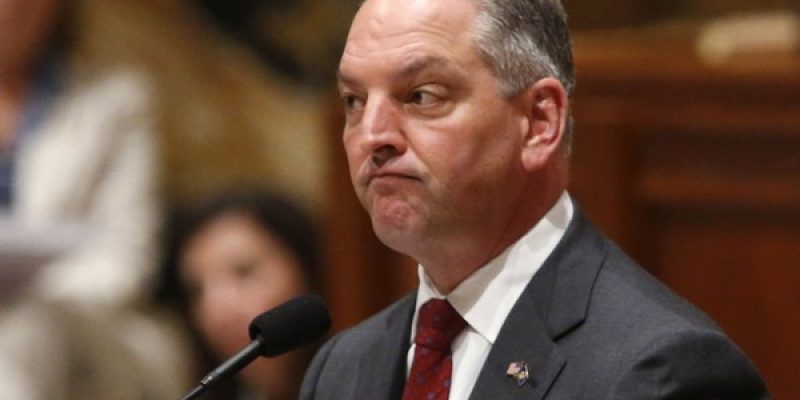The coronavirus (referred to herein sometimes as the Wuhan Flu but never the Kung Flu), while serious, does not rise to the level of a public health emergency. Gov. John Bel Edwards’ reliance on it for a first-rate power grab is a violation of Louisiana law.
JBE is basing his power grab on the Louisiana Health Emergency Powers Act, which gives him the authority to declare a state of public health emergency and, in connection thereto, to, among other things, make orders which “control ingress and egress to and from a disaster area, the movement of persons within the area, and the occupancy of premises therein.” To be sure, he also tries to rest his authority on the Louisiana Homeland Security and Emergency Assistance and Disaster Act which is a whole other chapter in a whole other part of Louisiana law and does not apply here. In fact, while he mentions that a few times in the prefatory comments in his latest proclamation, he never actually invokes it.
But here’s the thing: based on what we know, the Wuhan coronavirus does not meet the definition of a public health emergency. Our law defines a public health emergency in La. R.S. 29:762 as follows:
(12) A “public health emergency” means an occurrence or imminent threat of an illness or health condition that:
(a) Is believed to be caused by any of the following:
(i) Bioterrorism.
(ii) The appearance of a novel or previously controlled or eradicated infectious agent or biological toxin.
(iii) A disaster, including but not limited to natural disasters such as hurricane, tornado, storm, flood, high winds, and other weather related events, forest and marsh fires, and man-made disasters, including but not limited to nuclear power plant incidents or nuclear attack, hazardous materials incidents, accidental release or chemical attack, oil spills, explosion, civil disturbances, public calamity, hostile military action, and other events related thereto.
(b) Poses a high probability of any of the following harms:
(i) A large number of deaths in the affected population.
(ii) A large number of serious or long-term disabilities in the affected population.
(iii) Widespread exposure to an infectious or toxic agent that poses a significant risk of substantial future harm to a large number of people in the affected population.
To be a public health emergency, the event must have both an (a) condition and a (b) condition. You must have one of both (a) and (b) in order to declare a public health emergency. We can assume, for the sake of argument, that (a) is satisfied by either Bioterrorism or the appearance of a novel infectious agent or biological toxin.
However, you still must have at least one of the conditions of (b) apply to be a public heath emergency.
Herein lies the problem: (b)(i), (b)(ii), and (b)(iii) each require you to determine what constitutes a “large” number and, since the statute doesn’t define “large,” the reader is left to his own imagination as to what might constitute a “large” number of deaths, a “large” number of disabilities, and/or a “large” number of people.
And that, my friends, is unconstitutionally vague.
As Justice Gorsuch recently wrote, “Vague laws contravene the ‘first essential of due process of law’ that statutes must give people ‘of common intelligence’ fair notice of what the law demands of them.” Put another way, as the Louisiana Supreme Court has stated, “[o]ur prior jurisprudence indicates a statute is unconstitutionally vague if an ordinary person of reasonable intelligence is not capable of discerning its meaning and conforming his conduct to it.” State v. Barthelemy, 545 So.2d 531 (La. 1989). (We realize people of common intelligence is one thing the fourth floor is somewhat lacking, but humor us here.) For a list of laws that have been struck as vague, you can turn to the all-knowing oracle of Wikipedia. (For those of you who might argue that vagueness is a criminal doctrine, I would remind you that violating the Gov’s orders has now been criminalized.)
Advertisement
There can be no doubt in my mind that “large” is impermissably vague. The statute never defines “large” and the Governor must guess as to what is “large.” If he finds that five cases or deaths constitute a “large” number then he may grab the power of proclamation and proclaim the state shut down.
Which brings us to another question: is the Governor inflating the numbers of death in order to bolster an argument that we have “a large number of deaths” and thus retain the authority to shut down the state? As Scott reported back in March, there is reason to doubt the numbers coming out of the state. We also know that Louisiana is claiming a much higher number of deaths caused by the Wuhan Flu than any of its surrounding neighbors, according to Johns Hopkins University, which is tracking this sort of thing:
- Louisiana 1103
- Texas – 375
- Mississippi – 122
- Arkansas – 33
And we also know that Edwards’ Department of Health isn’t tracking recoveries, as Scott also reported a few days ago. This all indicates to us that Louisiana is inflating its doom and gloom numbers, and now we believe we know the reason why: to keep his numbers sufficiently “large” to enable him to restrict the State’s economy while bolstering his dictator authority.
At the end of the day, Edwards’ proclivity to larger government makes his power grab on the basis of “large” numbers of cases constitutionally suspect. It’s time that John Bel end this charade now and allow Louisiana to get back to business.
Advertisement
Advertisement

